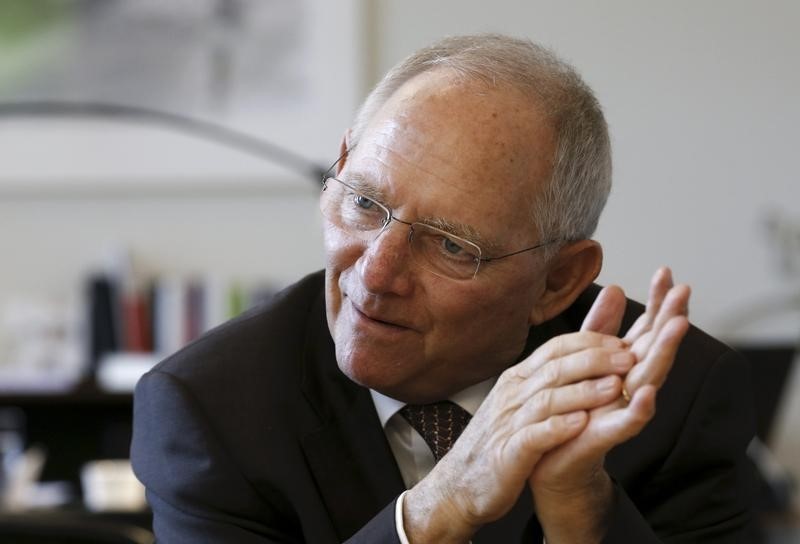By Michelle Martin and Gernot Heller
BERLIN (Reuters) - German public support for the euro is dwindling worryingly due to the Greek crisis and the European Central Bank's decision to buy a trillion euros of government bonds, Finance Minister Wolfgang Schaeuble told Reuters on Monday.
"You have to see the danger, there's no question about that," the veteran conservative said at the Reuters Euro Zone Summit, when asked if renewed Greek turmoil and the debate about low interest rates were starting to turn Germans against the single currency.
German politicians, economists and media reacted with dismay to the ECB's scheme to buy government bonds to revive ultra-low inflation. This could boost support for the Eurosceptic party Alternative for Germany (AfD), which is poaching votes from Angela Merkel's conservatives.
The chancellor is worried the ECB programme could remove the incentive for struggling euro zone states like Greece to carry out painful structural reforms. Schaeuble said he had noticed the "echo" in Germany to the ECB's announcement.
"The German government can only do what it's trying its best to do - namely to convince people that the economic integration of Europe with the common currency is in the best interest of Germans," he said in an interview at his office in Berlin.
While populist movements were fighting against mainstream politics in France, Britain and Spain, that is "part of the democratic debate" and should be respected as such, he said.
"But in the end the majorities must decide, and in Europe we know we can only play a role in this rapidly changing world together, so Europe has to become more competitive - Germany is doing its bit but some of our friends could do more," he said.
He did not name those falling short, but Berlin has made clear it wants to see more ambitious reform in France and Italy.
Schaeuble said the weakening of the euro was partly due to ECB monetary policy. This was boosting the competitiveness of all euro zone states in the short term, but would have other effects - which he did not specify - in the long term.
NO UNILATERAL CHANGES
"Of course we're seeing a clear weakening of the exchange rate due to a series of economic developments and market evaluation and not least due to the ECB's monetary policy," Schaeuble said.
Greece had made more progress than most people thought possible but must stick to its commitments, the minister said.
The new Athens government led by the radical left Syriza party has called for a partial write-off of Greece's debt to euro zone partners, an end to austerity imposed by international creditors and a reversal of some pay and pension cuts.
"We want Greece to continue going down this successful path in the interests of Greece and the Greeks but we will not accept one-sided changes to the programme," Schaeuble said, adding that Berlin did not find it convincing to put the bailout programme up for discussion unilaterally without having a better solution.
Schaeuble said he would be pleased to meet new Greek Finance Minister Yanis Varoufakis, who has visited Paris and London and will be in Rome on Tuesday to make the case for a new debt deal. Schaeuble's spokeswoman said they would meet in the coming days.
The International Monetary Fund, European Central Bank and European Commission must remain involved in supervising the bailout even if the word 'troika' had a negative "symbolic impact" on some Greeks, he said. This was agreed under EU treaties, said Schaeuble, adding: "You can't change them."
No one had an interest in any euro zone country getting into further difficulty, he said, but there was no question of extending Greece's financial rescue if it did not fulfil the conditions for its current programme.
